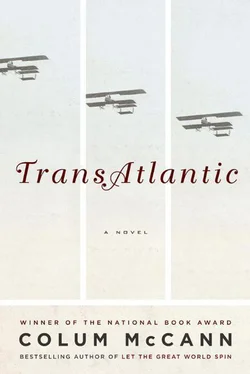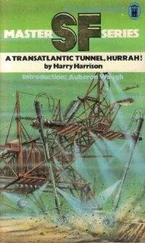— Bravo, called an elderly man.
A tentative round of applause rang out. A young cleric rushed forward to shake Douglass’s hand.
— Hear, hear.
The approval sallied around the room. The maid in the black dress lowered her eyes to the ground. After tea and biscuits in the living room, Douglass shook hands with the men, politely excused himself. The women were gathered in the library. He knocked at the door, entered cautiously, bent slightly at the waist, bid them good night. He heard them murmuring as he moved away.
Webb guided him up the curving staircase by the light of a glass-fluted candle. Their shadows spread haphazard against the wainscoting. A washbasin. A writing table. A chamber pot. A bed with a brass frame. He opened his trunk and took out an engraving of his wife and children, set it alongside the bed.
— It’s an honor to have you in my house, said Webb from the door.
Douglass leaned across to blow out the candle. He could hardly sleep. The sea was still moving in him.
IN THE MORNING Webb drove him around in a horse and carriage. He wanted to show him the city. Douglass sat alongside him, up front, on the wooden boards, exposed to the weather.
Webb was short, thin, narrow, proud. He used the whip judiciously.
At first, the streets were clean and leisurely. They passed a tall gray church. A row of small neat shops. The canals ran straight and true. The doorways were brightly painted. They doubled back and went into the city, past the university, the Houses of Parliament, along the quays, towards the Customs House. Farther along, the city began to change. The streets narrowed. The potholes deepened. Soon the filth was staggering. Douglass had never seen anything quite like it, even in Boston. Piles of human waste slushed down the gutter. It sloshed its way into fetid puddles. Men lay collapsed by the railings of rooming houses. Women walked in rags, less than rags: as rags. Children ran barefoot. Specimens of ancient ruin glared out of windowsills. Windows were dusty and broken. Rats darted in the alleyways. The carcass of a donkey was left bloated in the courtyard of a tenement. Dogs went forth, leanshouldered. There was a reek of porter about the streets. A young beggar sang a melody in a tired voice: a police boot sank savagely into her rib cage and moved her along. She fell at the next railing, lay against it, laughing.
The Irish had little or no order about themselves, he thought. The carriage went corner unto corner, turning, always turning, gray unto gray. It began to drizzle. The streets were muddy and even more deeply potholed. The sound of a fiddle was rent through with a scream.
Douglass was unnerved by what was unfolding around him, but he stared out eagerly, absorbed it all. Webb cracked the whip down on the horse’s back. They clopped back up Sackville Street, past Nelson’s Pillar, towards the bridge, across the river once more.
The Liffey was dimpled with rain. A low barge made its way down from the brewery. The wind ran raw and unstoppable along the quays. Vendors of fish moved over the cobbles, pushing barrows of stinking shells.
A tribe of boys in rags jumped onto the side of the carriage. Seven or eight of them. They used the moving wheels to propel themselves on, then hung perilously by the tips of their fingers. Some of them tried to open the carriage door. Laughter and puddle-fall. One monkeyed across and landed softly on the wooden board, nestled his head against Douglass’s shoulder. A series of raw red welts ran along the boy’s neck and face. Webb had implored him not to give away coins, but Douglass slid the boy a ha’penny. The child’s eyes grew slick with tears. He kept his head on Douglass’s shoulder as if welded there. The other boys leaned in from the side of the carriage, shouting, pushing, cajoling.
— Mind your pockets! said Webb. No more coins. Don’t give them any more.
— What are they saying? said Douglass.
The din was extraordinary: it sounded as if they were chanting in rhyme.
— No idea, said Webb.
Webb pulled the carriage up near a laneway, one wheel on the footpath, shouted at a policeman to scatter the boys. The whistle was lost in the air. It took three of the constabulary to dislodge them from the carriage. The gang ran through the laneway. Their shouts ricocheted.
— Thanks, mister! Thanks!
Douglass took a handkerchief to his shoulder. The child had left a long stream of snot along the arm of his coat.
HE HAD NOT imagined Dublin this way at all. He had envisioned rotundas, colonnades, quiet chapels on the street corners. Porticoes, pilasters, domes.
They passed through a narrow arch into a chaos of men and women. They were gathered for a meeting in the shadows of a theater house. A redheaded man stood on top of a silver keg, barking about Repeal. The crowd swelled. Laughter and applause. Someone responded with a shout about Rome. The words volleyed back and forth. Douglass couldn’t understand the accents, or was it the language? Were they speaking in Irish? He wanted to descend the carriage and walk amongst them, but Webb whispered that there was trouble brewing.
They continued down a havoc of backstreets. A woman carried a tray of kale on a string over her neck, trying in vain to hawk the exhausted green leaves.
— Mr. Webb, sir, Mr. Webb, y’r honor!
Webb broke his own rule, handed her a small copper coin. She ducked away into her headscarf. She looked as if she were praying over the coin. A few coils of hair escaped, damp and coarse.
Within seconds they were surrounded. Webb had to force the carriage through the crowd of stretched hands. The poor were so thin and white, they were almost lunar.
A LADY ALONG George’s Street gripped her umbrella as the carriage passed by. A newspaperman who happened to glimpse him wrote afterwards that the visiting Negro looked rather dandy. An audacious whore on the corner of Thomas Street shouted that she would laugh at his best and whistle for more. He caught sight of himself in a shop window and froze the picture in his mind, stunned at the opportunity for public vanity.
THE STORM MADE the carriage list sideways. Douglass looked for a crack of light in the clouds. None came. Rain fell more steadily now. Gray and unrelenting. Nobody seemed to notice. Rain on the puddles. Rain on the high brickwork. Rain on the slate roofs. Rain on the rain itself.
Webb entreated him to sit below where he could dry off. Douglass descended. The seats inside were made of soft leather. The handles were brushed bronze. He felt foolish, cowardly, warm. He really should sit outside, bear the brunt of the weather, like Webb. He stamped his feet, opened the neck of his coat. His body steamed. A puddle grew at his feet.
Up near the cathedral, there was a break in the rain. The city opened with afternoon sunlight. He climbed out and stood on the pavement. Children were jumping rope, calling rhymes to one another. One-Eyed Patrick Walker, met a girl, begat a daughter, the girl she turned to dirty water, one eye ’tain’t your fault, sir . They crowded around him, touched his clothes, removed his hat, pushed their fingers through his hair. Magpie, magpie, sitting on the sty, who oh who has the dirty greedy eye? They laughed at the feel of his hair: tall, bushy, wiry, uneven. A young boy shoved a twig in the mass of curls, ran off, whooping. A girl tugged on the end of his coat.
— Mister! Hey, mister! Are you from Africa?
He hesitated a moment. He had never been asked the question before. His smile tightened.
— America, he said.
— Christopher Columbus sailed the ocean blue, he won’t pick me and he won’t pick you!
The youngest amongst them was no more than three years old. His chest was bony. Leaves were tangled in his filthy hair. A fresh wound underneath his eye.
Читать дальше












